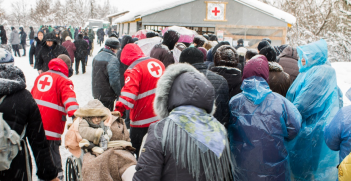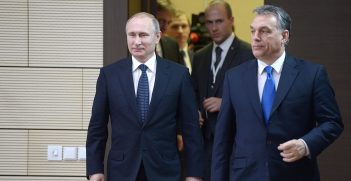The Western Promise to Aid Ukraine: One Year On

It is quite clear that when Vladimir Putin decided to invade Ukraine, the Russian president wasn’t expecting significant resistance. Ukraine’s fight has been aided by the pledges made by its Western allies, but have they delivered on their promises?
There is no question that Ukraine’s unanticipated success at thwarting the Russian offence has been bolstered by significant weaponry support from the United States, the United Kingdom, Estonia, Poland, and other Western European states. The combination of rocket systems, self-propelled and wheeled artillery, armoured vehicles, and air defence systems donated by mid-2022 ensured Ukrainian civil militia were well equipped for defending as well as recapturing lost territory. In this sphere, the US maintains the position of the largest donor, with a €44.3 billion pledge. Considering this amount exceeds the sum of pledges from all other countries, the US has been accused of fighting a proxy war by Russia, North Korea, and several domestic American media outlets.
This toll on American arms manufacturers and America’s preparedness to address other security threats has begun to weigh on domestic political support. Despite President Joe Biden’s tour of Kyiv in a show of solidarity, 40 percent of Republicans and 15 percent of Democrats have begun to feel there is too much aid provision to Ukraine.
At the recent Munich Security Conference, France and Germany made their perspectives on military support clear: they will supply existing weapons systems, but at no point facilitate escalation by providing heavy military hardware. This is in response to Kyiv’s continual call for warplanes and heavier weaponry as their forces fight to resist Russia. However, France and Germany have also been considering the prospects of a negotiated settlement, clearly fatiguing of conditional support. To this end, the European states have not felt they can afford to provide weaponry capable of launching attacks on Russian territory. Moreover, US and European leaders are distinctly averse to escalation, wary of ensnaring NATO in a direct conflict with Russia.
Further promises of military support to Ukraine have been made of over 300 tanks from around the globe. The US, UK, Canada, Germany, and Poland have all committed to specific amounts after intensive NATO deliberation, which Ukraine hopes will animate other European nations to also donate tanks. Among the ranks of Central European states is Australia, assuring AUD$475 million in military assistance, including additional Unmanned Aerial Systems for surveillance and reconnaissance purposes.
Clearly, there has been no shortage of pledges from many Western nations. UK Foreign Secretary James Cleverly exclaimed at the UN that their “support for Ukraine is not, and will never be, time-limited.” Biden has expressed on many an occasion that the US will support Ukraine “as long as it takes.”
However, these sentiments have fallen to accusations of being “two faced.” The call for fighter jets has largely been ignored by the US and EU. The UK’s promise of jet fighters and pilot training is only due for delivery after the current war. Meanwhile, senior officials in the Biden administration have remarked that Congress is unwilling to provide military and economic funding in perpetuity, meaning there will be an end date.
If Ukraine’s military has fought with unforeseen zeal and achieved such success, it is because of this support and the phenomenal amount of ammunition, artillery, and modern weapons that the West has supplied. It is no exaggeration to say that the Ukrainian war effort has been propped up by the support of a few wealthy, democratic states. It is no surprise therefore that the Kremlin accuses the West of unnecessarily prolonging and widening the conflict. For Russia, its strategy has come to increasingly depend on a war of attrition, aiming to snatch success when supplies to Ukraine eventually dry up.
To ensure this strategy fails, the responsibility has fallen on Ukraine’s allies to make sure the well never dries. Despite much political posturing and grandstanding, not a single new tank has yet been deployed to Ukraine. Crucially, these states have also failed to provide sufficient ammunition as Ukraine’s stores run close to exhaustion. President Volodymir Zelensky has emphasised the strategically critical nature of timely supplies in his latest meetings with European and US leaders. Part of that message is that the success of the Russian territorial offensive is entirely dependent on the West’s ability to arm Ukraine.
In engaging in military support against Russia, prominent NATO states are perhaps rightly concerned about an escalation of the war, nuclear or otherwise. Having committed significantly to economic sanctions on Russia, which have contributed to hurting the global economy and ramping up the cost of living, perhaps it is harsh to accuse Western states of a lack of conviction. Looking at the EU’s welcoming of refugees and the billions of euros in humanitarian assistance collectively pledged by the US, Germany, Canada, and Austria, clearly there is a care for the people of Ukraine.
However, Western allies of Ukraine must consider whether they are willing to see this war through or simply grandstanding at a current convenience. The major players – US, Germany, and France – need to examine whether they truly align with Ukraine’s goal to secure a complete win. If not, they need to secure a safe truce. The vagaries of “we stand in solidarity” without any true conviction will certainly be the loss of life for many Ukrainians.
Flony Anjilivelil is a final semester student of the Bachelor of International Relations and Bachelor of Politics Philosophy and Economics at the Australian National University. He is also an intern at the Parliament of Australia and works as an all-source analyst with the Humanitarian and Disaster Relief Institute.
This article is published under a Creative Commons License and may be republished with attribution.





